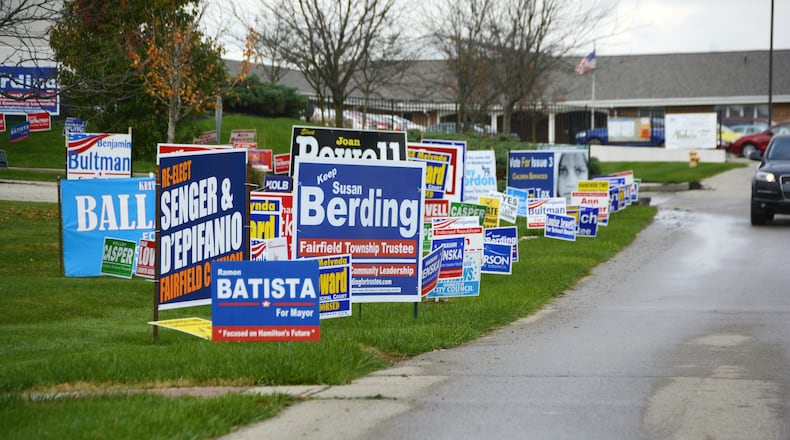And the trend lately this election season is to support non-Republicans, said University of Cincinnati political science professor David Niven.
“The tide is very much against Republicans nationally right now,” he said. But that trend, he said, isn’t likely to spread into Butler County, calling it “well above the flood line.”
Traditional campaigning has been thrown out the window for the 2020 election season, and Niven said it can even be a poor decision for “ill-funded candidates” to plan to outwork opponents by knocking on doors and making personal connections. Door-knocking campaigns have been a standard campaign strategy for centuries, and political careers have been launched by the grassroots tactic.
“That is a lot harder to do right now,” Niven said. “The candidates who make the most of campaigning in 2020 will be exceptional at all things online,” Niven said, especially balancing social media outreach, creating intriguing content, and staying relevant in an election season overwhelmed by the COVID-19 pandemic and the presidential race.
Butler County voters will decide only eight of 25 offices up for election in the Nov. 3 general election, and a few pocketbook issues, including two countywide tax levy renewals. None of the contested elections includes a county-level office or judgeship.
Miami University political science professor Chris Kelley said he would agree Republicans nationally are at a disadvantage, especially if all things were equal, but it’s not in Butler County, one of the more conservative counties in Ohio, that saw Democrats outnumbered as many as four to one.
The Republican Party has dominated partisan offices over the past few decades in Butler County, and only one countywide official — juvenile court Judge Kathleen Romans — is a Democrat. This election, though, that Republican to Democrat ratio is down to two-to-one.
“For the GOP, the advantages of incumbency coupled with gerrymandering is supposed to serve as a break wall to diminish the wave from crashing over, if there is one. And for challengers, there is the disadvantage of not being able to campaign and fundraise as you normally might,” Kelley said.
Though Kelley agrees 2020 nationally can be a good year for non-incumbents, “and especially a candidate who is not tied to the GOP,” the majority of incumbents have the advantage amid a pandemic election.
“Incumbents should benefit from the current environment because a challenger is not going to be able to do the normal things you need to do in order to get visibility in the eyes of voters,” Kelley said.
Get out the vote efforts are hindered because volunteers may be hesitant about walking door-to-door, and residents may be hesitant talking with a candidate when COVID-19 — which currently does not have a vaccine — is still very contagious. Additionally, he said challengers are not going to be able to hold traditional fundraisers to raise cash to be competitive in November.
Kelley highlighted the 4th Ohio Senate District race as an example where the GOP has the advantage outside of being the county’s dominant party.
“(Democratic candidate) Kathy Wyenandt did not have a competitive primary, meaning most of the attention was focused on who would take out (State Rep. Candice) Keller (in the GOP primary),” he said. “(State Rep. George) Lang, who emerged victorious, is a prolific fundraiser who has raised nearly four times the money that Wynenandt.”
The inability to hold the kind of events needed to meet people and raise money hurts Wyenandt, Kelley said. In 2018, a cornerstone of Wyenandt’s campaign was to hold house party fundraisers, which aren’t happening in 2020..
“Since she is unable to hold the kind of events she needs to get out into the Senate district, she has been reduced to recreating the fundraiser virtually,” Kelley said. “It is just not the same.”
Butler County preparing for November election that still includes in-person voting https://t.co/9b9byIR1jX
— journalnews (@journalnews) August 5, 2020
IMPORTANT ELECTION DATES
Sept. 18: Military and overseas absentee voting begins
Oct. 5: Voter registration deadline. Ohioans can register online or until 9 p.m. at their county board of elections office
Oct. 6: Absentee voting and in-office early voting can begin.
Oct. 24-25: First of two weekends for in-office early voting at boards of elections
Oct. 31-Nov. 1: Second of two weekends for in-office early voting at boards of elections
Nov. 2: Last day for in-office early voting, all absentee ballots must be postmarked by this date. Last day for military and overseas absentee voting
Nov. 3: Election Day. Polls open from 6:30 a.m. to 7:30 p.m., and absentee ballots may be hand-delivered to the elections office by 7:30 p.m.
About the Author

